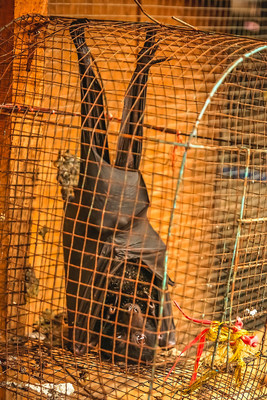Subjects: NPT, AVO, ANW
World Animal Protection Calls on G20 Leaders to Help Prevent Another Pandemic
TORONTO, May 12, 2020 /CNW/ - Economies shutting down, healthcare services in dire straits and physical distancing became our new reality with COVID-19. The origin of the pandemic likely can be traced to a market that sells wildlife in China, where a wild animal transmitted the virus to a human. The global charity World Animal Protection believes unless there's a ban on all commercial trade of wild animals globally, a similar pandemic could happen again. That is why all 14 of the charity's country offices are pushing their G20 governments to support a ban through a new campaign called "End the global wildlife trade. Forever."
This is a global problem that needs a global solution and Canada plays a role here. The Canadian Wildlife Service and the Canadian Food Inspection Agency only track a small fraction of the wildlife species that are commercially and legally traded. Desktop research suggests that certain reptiles, for example, can be imported without a health check. That means any diseases these animals might carry can go largely unnoticed.
The wildlife trade is a multi-billion-dollar industry which rips animals from their natural environments or commercially farms them, exposing them to stress and cruelty, creating a hotbed for disease. As we have seen with COVID-19, these diseases can then be transferred to humans. The exploitation of these animals puts our health, biodiversity and economies at risk.
In fact, according to recent media reports it's estimated the cost of the coronavirus pandemic globally could be as high as $4.1 trillion, or almost 5% of global gross domestic product, depending on the disease's spread through major economies like Europe and the U.S.
Melissa Matlow of World Animal Protection Canada says, "The costs are clearly too high to allow the dangerous commercial wildlife trade to continue unabated. We are urging Canada and other G20 countries to curb this trade to prevent future pandemics and another global health and economic crisis."
The main reason for the wildlife trade is public demand for wild animals as food, traditional medicine, exotic pets, entertainment and fashion accessories. At least 70% of emerging zoonotic infectious diseases are believed to originate from wildlife ? this demand puts us all at risk.
World Animal Protection has been campaigning for years to shift social attitudes and reduce demand for wild animals, including for the following uses:
Traditional Medicine
The demand for traditional medicine has devastating consequences for many species of wildlife traded globally, including bears who are poached and farmed for their bile, which World Animal Protection investigated in a recent report.
The research also showed that bears are being hunted in Canada and illegal bear bile products are being sold in shops in Toronto and exported to countries in Asia.
Plant-based alternatives to bear bile are available and by fully transitioning to plant-based options, the industry can end this cruelty.
Exotic pets
Each year, millions of wild animals are captured from their natural habitats and bred in cruel captive conditions to be traded around the world as pets. Many of them die in transit before they reach a final destination and it's estimated 25% of the global exotic pet trade is illegal. Snakes, tortoises and parrots are just some of the wildlife species suffering as pets around the world, including in Canada. World Animal Protection's research shows there are currently 1.4 million exotic pets owned in this country.
The ongoing risk to human health, the global economy and animal welfare caused by inaction is too high. Call on Canada to help end the global trade of wildlife and eliminate threat of future pandemics. Sign the petition here.
About World Animal Protection
From our offices around the world, including Australia, Brazil, Kenya, and Canada, we move the world to protect animals. Last year, we gave more than 3 billion animals better lives through our campaigns that focus on animals in the wild, animals in disasters, animals in communities and animals in farming. For more information visit www.worldanimalprotection.ca
SOURCE World Animal Protection
These press releases may also interest you
|
News published on and distributed by:




